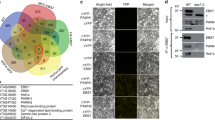Abstract.
We tested three different protein domains for their ability to confer a short half life onto the otherwise stable test protein dihydrofolate reductase (DHFR) in the plant Arabidopsis thaliana. E-DHFR, a protein with Glu as the first residue, is metabolically unstable in Arabidopsis, indicating that Glu is a destabilizing residue of the plant N-end rule pathway. In contrast, the degradation signal deg1 from Saccharomyces cerevisiae transcription factor Matα2p is not recognized when present at the amino-terminus of DHFR. Finally, we show that the amino-terminal 93 amino acids of the plant protein 1-aminocyclopropane-1-carboxylic acid synthase contain a degradation signal that is also active in yeast.
Similar content being viewed by others
Author information
Authors and Affiliations
Additional information
Electronic Publication
Rights and permissions
About this article
Cite this article
Schlögelhofer, .P., Bachmair, .A. A test of fusion protein stability in the plant Arabidopsis thaliana reveals degradation signals from ACC synthase and from the plant N-end rule pathway. Plant Cell Rep 21, 174–179 (2002). https://doi.org/10.1007/s00299-002-0493-5
Received:
Revised:
Accepted:
Issue Date:
DOI: https://doi.org/10.1007/s00299-002-0493-5




